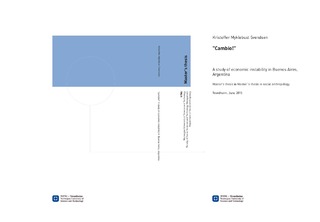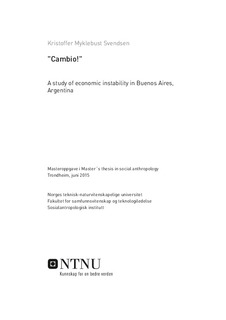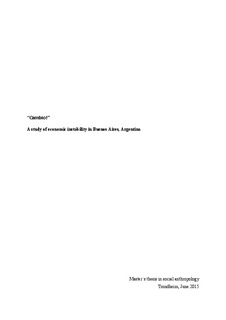| dc.description.abstract | This thesis attempts to describe some of the techniques that are employed to preserve economic value in Argentina, when the peso looses its purchasing power through inflation, and the exchange rate towards the US dollar is weakened by devaluations. A topic related to this is how people get information about the value development of the national currency. Thus, the research question of this thesis is: How is economic value conceptualized and preserved in the volatile economic climate of Argentina?
The text will begin with an historical introduction, although an inverted one, where I will attempt to consecutively trace developments in the economic history of Argentina. The chapter is structured in a way that it begins with the present day, where an anechdote from an informant,
Ramiro Diaz1, is used to describe the uncertainties that people experienced during the days of the economic crisis that culminated in 2001. Ramiro got his money that he kept in the house stolen, and the value of the money in his bank account was devalued, causing a lack of trust in institutions. The next subchapter attempts to describe some of the reasons for this event by analyzing the political developments of the 90 s. This part deals with the trade liberalizations, the reductions of taxes and the currency peg, that led to decreased income for the Argentine state. The following subchapter traces the advent of neoliberalism during the military dictatorship from 1976-1983, and how implementations of policies was rewarded with granting of loans by the IMF. The debt burden on the Argentine government was also increased by a nationalization on private debt during the dictatorship. The increases in the debt burden, when combined with the conditionalities of the 90 s, demanding budgetary balance, led to privatizations of public enterprize in this period. This eventually led to a crisis, with a default on foreign debt, a devaluation of the Argentine peso, and increased poverty rates. The recovery after this crisis was marked by increased state spending, which several informants believe is one of the possible reasons for the inflation.
After a methodological part, dealing with the nature of fieldwork and difficulties therein, the following part deals with the acquisition of dollars. These are acquired on the black market, where currency exchangers shout their offers to potential customers. The title of this thesis, ”Cambio!”, comes from the word that means ’’exchange”. It refers to the exchanges between currencies that are conducted on the black market. In the rest of the chapter I introduce the informants, as they will be reintroduced throughout the text to provide its empirical corpus. Jorge worked at the blackmarket, changing dollars for a living. Gustavo was a young man saving up to buy an apartment, who did not have faith in the banks, and thereby saved his money at home. Sophia was more concerned with crime. The two latter informants represent the threats that Ramiro fell victim to when he lost his money, thereby exemplifying two characteristics of economic life in contemporary Argentina. My next informants further illustrate these tendencies, as Leandro used home redecoration to save value. Nani on the other hand, was more concerned with limitations on withdrawals. This illustrate the tendency that the trust is not reciprocated by the banks. Although these constitute my main informants, the text is supplemented by others that I did not meet that often.
The next part will concern itself with a ’vertical axis”, extrapolating the elements of institutional distrust expressed by my informants in the former part. This section will primarily be concerned with the struggle to establish legitimacy over the official statistics. A governmental intervention in 2007 caused many people to distrust the numbers coming from governmental sources, and the informants introduced in the former chapter will voice their opinions on this information about the inflation.
It turned out that all of them claimed that the government was manipulating the numbers, and that they were incorrect. Manipulation of perceived value is also an element in explaining the phenomenon of ’pizza and champagne” during the 90 s to show that the numbers designating purchasing power in Argentina is of historical importance. Contemporary manipulations are evident also in the price of the big mac. However, where trust in the official statistics are discredited by my informants, an interview with two employees at the Buenos Aires stock exchange showed that the latter nevertheless used this information in their economic analyses. On the other hand, technology is contesting the legitimacy that the government claims. Conclusively, I will describe that manipulation of prices apparently also occur in the Argentine housing market, and this will function as a bridge into the last part.
The final part will have a temporal dimension, where I will pick up on the subject of saving and transmitting value in the volatile climate I have described. The platform where this is achieved is the home. My informants Sophia and Gustavo will again be voices from the fieldwork, and the latter will further explicate on his strategies of saving money, and his goal of this saving is to purchase a property to build a house. The house is then described as a unit for value preservation, and I will present examples of transmitting this value through inheritage to ones children. I use the strategy of purchasing electrical home supplies on a downpayment plan, which is another way of attaining stability, as a bridge into the last concluding part of the thesis. The World Cup in Brazil coincided with my fieldwork, and as it exemplifies several aspects of what the thesis has tried to convey, I conclude by a describing some of the impressions I got during the tournament, as this was an event to important to be left out of any ethnography from Argentina during this period. | nb_NO |


